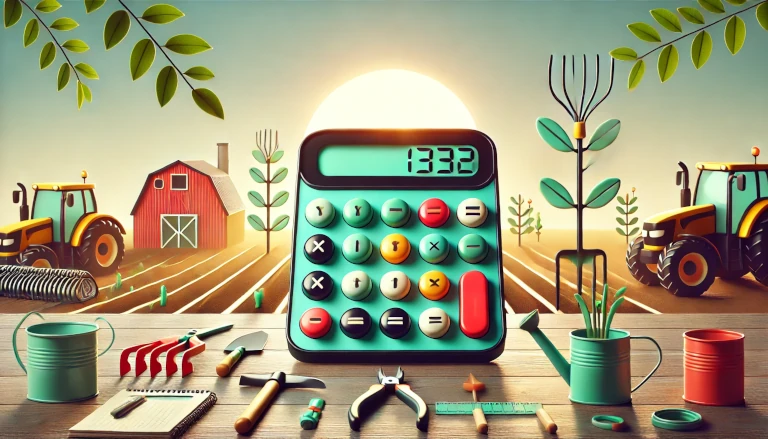An Agricultural Calculator is a specialized tool that helps farmers make informed decisions by providing quick calculations on various farming activities. From estimating crop yield and fertilizer requirements to calculating irrigation needs, this tool streamlines agricultural planning, making it easier for farmers to maximize productivity while reducing costs.
In this blog post, we’ll explore the features and benefits of agricultural calculators, how they simplify farm management, and practical examples of their applications.
What is an Agricultural Calculator? 🌱
An agricultural calculator is a digital or handheld device that assists farmers in performing essential calculations. It can estimate planting density, calculate fertilizer rates, and measure irrigation requirements based on factors like soil type, crop type, and weather conditions.
Key Functions of Agricultural Calculators:
- Fertilizer and Pesticide Calculation 🧴:
Farmers can use the calculator to determine the exact amount of fertilizer and pesticides needed for their crops, optimizing resources and reducing waste. - Yield Estimation 🌾:
With crop-specific inputs, the calculator provides yield predictions, helping farmers forecast their production and make informed selling decisions. - Water and Irrigation Management 💧:
The tool calculates irrigation needs, taking into account soil type, crop variety, and local weather, ensuring that crops receive adequate water.
Why Agricultural Calculators are Essential for Farmers 🧑🌾
Agricultural calculators simplify complex tasks, making them invaluable for both small-scale and large-scale farmers. Here are some benefits:
- Precision and Accuracy 📏:
By providing precise calculations, agricultural calculators help farmers use resources more efficiently, leading to better crop yields and reduced expenses.
- Example: A farmer can avoid overusing fertilizers by calculating the exact amount required for their specific soil and crop type.
- Time-Saving ⏱️:
Calculations that would take hours to complete manually can be done within minutes, freeing up time for other important tasks. - Environmentally Friendly 🌍:
By optimizing inputs like water and fertilizer, agricultural calculators reduce waste and promote eco-friendly farming practices.
How to Use an Agricultural Calculator Effectively 📲
- Gather Accurate Data 📝:
For the best results, collect accurate data on soil properties, crop types, and weather conditions. Input this information into the calculator for precise calculations. - Follow Manufacturer Guidelines 📖:
Each calculator may have specific instructions, so following the guidelines ensures accurate readings and optimal performance. - Use Regularly for Ongoing Adjustments 🔄:
Farming conditions can change, so using the calculator regularly allows for adjustments based on current data, leading to more consistent crop management.
Examples of Agricultural Calculators 🌾
- Fertilizer Calculators:
These help farmers calculate the amount and type of fertilizer needed based on soil tests and crop requirements. - Irrigation Calculators:
Ideal for areas with varying water availability, these tools determine the exact amount of water needed to maintain crop health. - Yield Prediction Calculators:
These calculators estimate expected crop yield, which is useful for planning harvests and predicting profits.
Enhancing Crop Management with Agricultural Calculators 🌾📊
Agricultural calculators offer a convenient way to manage crop inputs and improve farm efficiency. By using these tools, farmers can make data-driven decisions that boost productivity and reduce environmental impact. With precision, convenience, and environmental benefits, agricultural calculators are essential for any modern farming operation.
Discover more from Green Ecosystem - Renewable Energy, Agriculture, and Environmental Sustainability
Subscribe to get the latest posts sent to your email.


